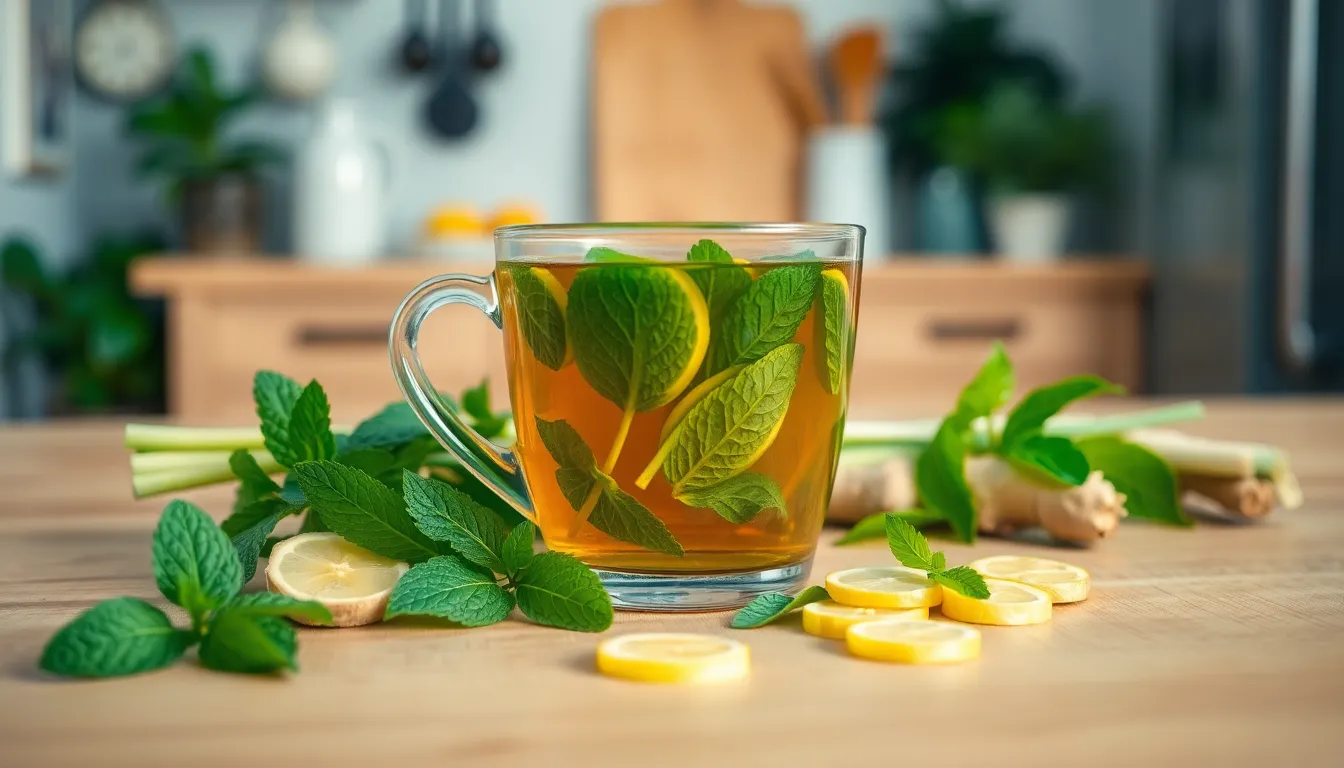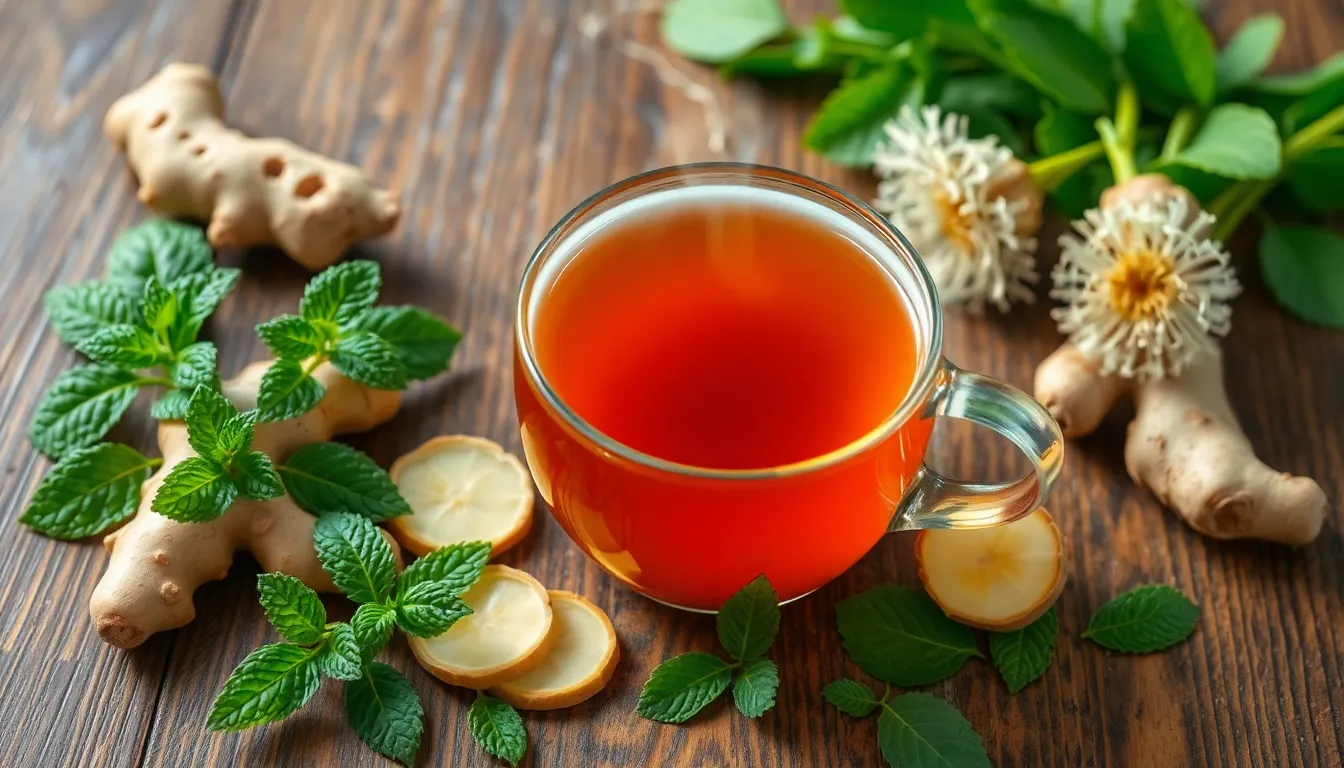Detox teas have surged in popularity as a go-to solution for those looking to cleanse their bodies and boost overall health. These herbal blends promise to support digestion, enhance metabolism, and promote a sense of well-being. With promises of quick results and natural ingredients, it’s no wonder they’ve captured the attention of health enthusiasts everywhere.
However, the world of detox teas can be overwhelming. With countless options available, each claiming unique benefits, it’s essential to separate fact from fiction. Understanding the ingredients and their effects can help individuals make informed choices and achieve their wellness goals. Whether for a gentle cleanse or a daily health boost, detox teas offer a flavorful way to support a healthier lifestyle.
Table of Contents
ToggleWhat Are Detox Teas?
Detox teas are herbal infusions designed to promote cleansing and enhance wellness. Typically composed of various herbs, leaves, and roots, these blends aim to support the body’s natural detoxification processes. Common ingredients include green tea, dandelion root, ginger, and peppermint, each contributing unique properties to the infusion.
Health Claims
Detox teas often claim benefits such as improved digestion, increased metabolism, and enhanced energy levels. Some ingredients, like senna and cascara, act as natural laxatives, while others, such as milk thistle, may support liver function. However, scientific evidence supporting these claims varies, with some studies showing potential benefits and others yielding inconclusive results.
Forms and Varieties
Detox teas come in several forms, including loose leaf, tea bags, and powdered formats. Different brands offer varying blends, targeting specific health goals. Popular forms include:
- Daily Detox Teas: Designed for regular consumption to support overall wellness.
- Short-Term Detox Teas: Intended for use over a limited period to kickstart a detox process.
Usage and Considerations
For optimal results, it’s essential to follow preparation instructions and recommended serving sizes. Excessive consumption may lead to side effects, such as diarrhea or dehydration. Consulting with a healthcare professional before starting a detox tea regimen is advisable, particularly for individuals with underlying health conditions or those taking medications.
Understanding the ingredients and claiming benefits helps consumers make informed choices.
Benefits of Detox Teas


Detox teas offer several notable benefits that can enhance overall well-being. These advantages stem from their carefully selected herbal ingredients.
Promoting Hydration
Detox teas promote hydration by providing a flavorful alternative to plain water. Herbal ingredients such as peppermint and lemongrass facilitate fluid intake, essential for bodily functions like temperature regulation and nutrient absorption. Maintaining adequate hydration supports skin health and helps flush out toxins from the body.
Supporting Digestion
Detox teas support digestion through herbs that are known for their soothing properties. Ingredients such as ginger and dandelion root can ease gastrointestinal discomfort, reduce bloating, and stimulate digestive enzymes. Improved digestion leads to better nutrient absorption and can enhance gut health, making detox teas a popular choice for those seeking relief from digestive issues.
Boosting Metabolism
Detox teas boost metabolism, helping the body burn calories more efficiently. Green tea, a common ingredient in detox blends, contains catechins, which may increase fat oxidation and improve metabolic rate. This enhancement may contribute to weight management when combined with a healthy diet and exercise routine.
Popular Ingredients in Detox Teas
Various ingredients contribute to the efficacy of detox teas. Understanding these components helps consumers choose options that align with their wellness goals.
Herbal Components
Herbal ingredients are central to detox teas. Specific herbs offer unique benefits:
- Green Tea: Contains catechins, known for boosting metabolism and promoting fat oxidation.
- Dandelion Root: Supports liver function and acts as a diuretic, aiding in the elimination of toxins.
- Ginger: Eases nausea and enhances digestion through its anti-inflammatory properties.
- Peppermint: Relieves digestive discomfort while providing a refreshing flavor.
- Nettle: Rich in vitamins and minerals, it supports overall health and acts as a mild diuretic.
Fruits and Spices
Fruits and spices enhance the flavor and effectiveness of detox teas. Popular choices include:
- Lemon: Rich in vitamin C, it aids digestion and detoxification.
- Cinnamon: Regulates blood sugar levels and enhances metabolic processes.
- Turmeric: Contains curcumin, known for its antioxidant and anti-inflammatory benefits.
- Apple: Provides natural sweetness and aids digestion with dietary fiber.
- Berries: Are rich in antioxidants, supporting skin health and detoxification.
These fruits and spices not only improve taste but also amplify detoxification effects, contributing to overall well-being.
How to Choose the Right Detox Tea
Selecting the right detox tea involves understanding quality and personal health needs. With so many options available, it’s crucial to analyze the ingredients and benefits carefully.
Considerations for Quality
- Ingredient Transparency: Choose brands that disclose all ingredients clearly. Look for high-quality herbs, leaves, and roots without added sugars or artificial flavors.
- Certification: Seek products that have third-party certifications, such as organic, non-GMO, or FDA-approved. Certifications ensure adherence to quality and safety standards.
- Sourcing: Investigate where the ingredients come from. High-quality teas often utilize sustainably sourced herbs from reputable growers.
- Packaging: Opt for detox teas packaged in airtight containers or bags to preserve freshness and potency. Packaging influences shelf life and effectiveness.
- Reviews and Reputation: Check customer reviews and ratings to gauge their experiences. A reputable brand usually has positive feedback and a loyal customer base.
Tailoring to Your Needs
- Health Goals: Identify specific wellness goals, such as enhanced digestion or improved metabolism. Select teas with ingredients that align with those objectives.
- Taste Preferences: Consider personal taste. Some individuals prefer fruity blends, while others enjoy earthy herbal flavors. Sample different varieties to find a preferred option.
- Caffeine Sensitivity: Evaluate tolerance to caffeine. Some detox teas contain green tea, which has caffeine. Seek caffeine-free options if sensitivity exists.
- Lifestyle Compatibility: Assess how the detox tea fits into daily routines. Choose teas that can be easily incorporated into morning or evening rituals, enhancing consistency.
- Health Conditions: Be mindful of any existing health conditions or medications. Consulting a healthcare professional ensures safe options that won’t interfere with health.
Potential Risks and Considerations
Detox teas may present several risks and considerations that consumers should address before incorporating them into their routines.
- Laxative Effects: Many detox teas contain ingredients like senna and cascara sagrada, known for their laxative properties. These can lead to dehydration, cramping, diarrhea, and electrolyte imbalance with excessive or prolonged use.
- Herbal Interactions: Certain herbs in detox teas may interact negatively with prescription medications. For example, dandelion root can affect blood thinners, while ginger may interact with blood pressure medications. Individuals taking medications must consult a healthcare professional.
- Nutrient Deficiencies: Relying solely on detox teas may limit nutrient intake, as they often substitute balanced meals. Long-term use can result in nutrient deficiencies, impacting overall health and energy levels.
- Increased Caffeine Intake: Some detox teas contain high levels of caffeine, which can lead to side effects like insomnia, anxiety, and increased heart rate. Monitoring caffeine consumption is important for those sensitive to it.
- False Claims: Many brands promote detox teas with unproven claims about weight loss and body cleansing. Scientific backing for these assertions remains limited. Consumers should critically evaluate marketing language and seek evidence-based information.
- Underlying Health Conditions: Individuals with liver disease, gastrointestinal disorders, or kidney issues must exercise caution. Certain ingredients may exacerbate these conditions, making medical advice crucial before starting detox teas.
- Psychological Impact: Overemphasis on detoxification can lead to harmful dieting behaviors or disordered eating patterns. Focusing on overall healthy eating rather than restrictive detox regimens promotes better long-term wellness.
Understanding these potential risks allows individuals to make informed choices concerning their health and wellness goals.





